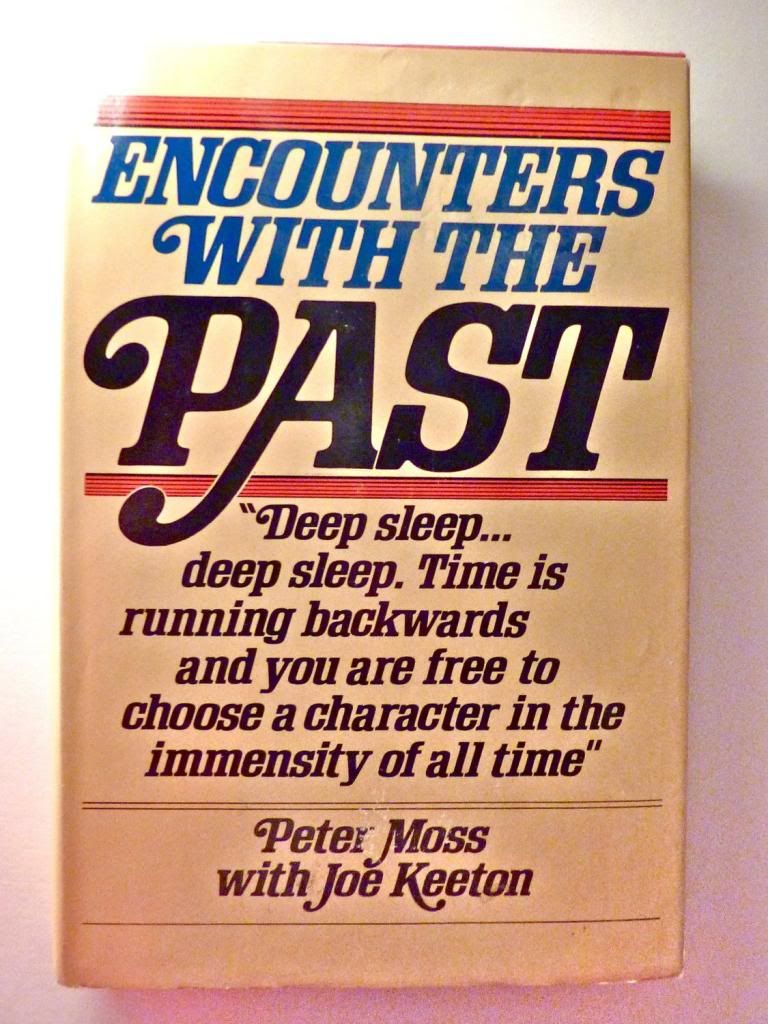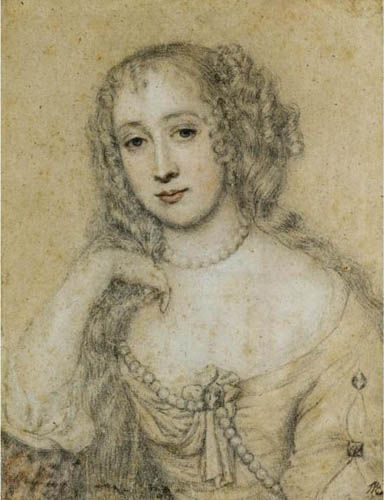I used to believe in reincarnation, but that was in a previous life.
Uh, sorry. What I meant was, I used to believe in reincarnation, and that was in this life. Now ... I'm not sure. A little while ago I wrote a post about the alleged spirit of Helena Blavatsky, a founder and popularizer of Theosophy, who recanted (from the Other Side) her teaching that the soul undergoes a series of earthly lives to learn the lessons needed for spiritual growth.
It's not unusual that I blog about something and the subject continues to rattle around my mind for days afterward, until I feel like I must study it more. This was such an eventuality. Not having a bunch of time to apply to it, I decided to re-read a book that had once impressed me.
That was Encounters With the Past: How Man Can Experience and Relive History (1979), by Peter Moss with past-life regression hypnotist Joe Keeton. (More recent editions have wisely dropped the misleading subtitle, which makes it sound like a how-to manual, which it is not.) Rather, it's an account of seven people in modern times who apparently recalled, under hypnosis, earlier personalities they had once been. In each case the past life memories emerged over many sessions, and Keeton was able to shift them to various ages in those lifetimes.
(The usual disclaimer: you can add "alleged," "supposedly" or other qualifiers to such statements. I refrain from the words' repeated use simply on stylistic grounds.)
What makes Moss's book particularly interesting is that, as a witness to the regressions described, he is still willing to question various aspects of the stories told by the "past life recallers" and try to analyze the evidence for and against their veracity. I can recommend two other books on reincarnation: Reliving Past Lives, by Helen Wambach, and Exploring Reincarnation, by Hans TenDam. Both authors are scientific in their research, but seem to take hypnotic regressions at face value.
Moss is -- correctly in my view -- on guard against assuming that the voices of previous personalities that emerge under hypnosis are literally what they seem to be. And he is continually struck by the contradictory factual status of claims by the people in other incarnations -- some remarkably accurate about little-known aspects of life in earlier times and places where the hypnotized subjects have never been, yet other statements that Moss's own thorough research tends to disprove.
I said in my Blavatsky posting, "In hypnotic regressions, there is usually a curious inability to come up with specifics, such as the person's name in the earlier life, the year, who was the king or president at the time, what the town, city, or country was called, &c." Moss writes, in a similar vein:
There are so few spontaneous mentions of births, illnesses and deaths; hopes and fears, successes and failures [recounted in the "past life memories"] are rare -- just small talk and evasive answers of the dullest kind. Memory, even if from another life, should be of stronger stuff, and it is difficult to explain why, if reincarnation is operating, a brownish skirt or a pot of rabbit stew should have some sort of immortality while the names of parents, a home town and a lifelong occupation may leave no imprint at all.So where does Nell Gwynn, 17th century actress, mistress to Britain's Restoration monarch Charles II, come in? She speaks to us via Edna Greenan of Liverpool, described by Moss as a 57-year-old housewife who "left school at the minimum age -- then fourteen -- and worked in a number of factories and shops, and in the same time bringing up a family of five children. ...
"Edna would deny any pretension to, or even interest in, literature or history, and though she was aware of the name Nell Gwynn before her regression, she knew virtually nothing of the person nor of the social and political background." (Nell is shown at right in a drawing by Sir Peter Lely, who made a good living portraying King Charles's mistresses with much flesh to be admired.)
Despite what many skeptics think, the vast majority of past-life recollections are not of terms spent as famous figures such as Julius Caesar or Marie Antoinette. Usually they were obscure, boring lives. This is one exception.
Nell Gwynn's origins were humble, to put it mildly. Moss transcribes this dialogue (questions by Keeton):
Q. You are Nell Gwynn with all the memories of a seven-year-old. Where are you?Although nothing in Nell's speech can be verified historically, it sounds oddly convincing. First, if the 20th century Edna Greenan was totally ignorant of Gwynn's life she would not have known that the girl started her career as a fishmonger. (No one can be sure of that detail either, but all the evidence we have suggests Nell began working in lowly jobs.)
A. (Instantly in a coarse voice) I'm sellin' bleedin' fish.
Q. How much do you charge?
A. (Shouting out stridently ignoring Keeton) Fresh 'errings ... thrippence ... fresh 'errings ... thrippence.
Q. You don't sell many at threepence do you?
A. Shut yer bleedin' mouth. (Calling out) Thrippence ... thrippence ... thrippence.
Q. Where do you get them?
A. (Pause) Eeeeee. I think Rose [her older sister] gets 'em me. I didn't get them.
Q. Yes, but where does she get them?
A. I don't bleedin' know where she gets 'em. (Calling out) Fresh herrings? thrippence ... do you want fresh herrings, lady ... Yes, I've just chopped their bleedin' heads off ... (Pause then in the normal conversational voice to Keeton) She bought a bleedin' 'errin'.
"At some time before she was ten the real Nell Gwynn gravitated to the tavern-brothel where her mother worked, running errands, serving drinks and it may be anything that might add a piquancy to customers with specialized interest," Moss writes. Nell would not have been one to tax a lot of her time in defending her honor when she later caught the eye of the King of England.
Keeton advances Nell to the age of eight.
Q. What do you do?But this doesn't feel entirely authentic. Nell was raised in or around London. No one except those whose origins are northern English (like Edna) says "nowt." That "back of t'throat" also sounds like it's spoken by somebody from "oop theah in t'North Coontry." And bonny lass? Pure Scottish as far as I know. Conceivably Nell might have picked up such alien (for London) expressions from a person or persons in her environment, but it's improbable.
A. I go to that gin shop over there ... I take gins around.
Q. What do they pay you for that?
A. They don't pay me nowt -- they give it Kate [her mother]. They say I'm making a bonny lass ...
Q. Have you ever had a sip of gin?
A. Yes.
Q. Do you like it?
A. I don't know right (smacks lips several times, runs tongue over lips not very happily for a few moments) Catches yer at back of t'throat a bit ...
The language question is one of the most vexing in past-life regressions. The old personalities seem to talk in more or less present-day English, although there is often a sprinkling of obsolete words. If someone from a previous incarnation speaks through a subject living now, it would not be surprising if the speech pattern was drawn mostly from the mind of the hypnotized subject.
Unfortunately Moss doesn't say anything about "Nell's" accent. He would surely have noticed if it had resembled Liverpool pronunciation, so perhaps it didn't. But even a Londoner from the time of Charles II would have sounded quite different from a native-born Londoner today. I wish our author had gone more deeply into this.
In further sessions, which Moss says tallied up to 80 hours or so, Keeton interviews Nell as she relates the ups and, well, downs of her career -- she says of another of her lovers, " 'E gives me 'undred pounds fer lyin' on me back ... ." Considering all the time spent on regressions, the signal-to-noise ratio is typically poor.
Still, there are intriguing "hits." Nell frequently mentions her acquaintance with the famous literary diarist Samuel Pepys (whom she knew well enough to nickname Pippy), which is historically correct, as Pepys mentions her in his diary. Of course this could be discovered with a little research, but Edna is adamant that she has had no time to study that era and never read a book concerning it.
Nell also mentions the plot fabricated by Titus Oates, an incident now forgotten by all but scholars of the period.
In another questioning session, she says:
A. I know ... I know what you'd like to know.Moss says, "The new halfpenny of 1672 carried for the first time on the reverse the traditional figure of Britannia, for which Frances Stewart was indeed the model."
Q. What's that?
A. I told you about Frances ... Frances Stewart -- didn't I? Well ... Charles decided he'd 'ave a new (gropes for the word) ... a new coin ... an half penny ... a new half penny ... an' Frances is on the back of it ... she's sat there 'oldin' something up ... an' something on 'er 'ead ... an' she's sat there.
But for someone who lived through an intensely dramatic period of British history, including the re-establishment of the monarchy after 12 years of Puritan rule, a king much remembered for his pleasure-seeking ways, the reopening of the theaters, the Great Fire, and the Plague, Nell is vague and mostly sounds unconcerned. "For an event as traumatic as the Great Plague, which must have struck the ultimate terror into the heart of every Londoner, Edna/Nell gives nothing but the stereotyped picture that every schoolchild knows," Moss says.
In one respect Edna's case is almost bulletproof. It is often claimed that so-called past life memories have their origin in information that was read or heard by normal means, but consciously forgotten (a phenomenon called cryptomnesia). According to this view, a few facts unknowingly retained from a novel, conversation, movie or similar source are released from the unconscious and form a nucleus around which the subject creates an imaginative past-life story.
Perhaps that happens in some cases. It seems, though, unable to explain what must by now be tens of thousands of regressions performed by experimenters and therapists. Considering Edna's hard life in Liverpool, England's poorest city at the time and not a center of intellectual life, the chance is vanishingly small that information about Nell Gwynn or the Restoration era came her way.
A lot more could be said about the chapter on Edna's regression, as well as those about the other subjects' regressions induced by Keeton. But this is getting to be a long entry, and you may be pushed for time, so let's stop here and ask: what can we conclude?
Very little. The evidence supports two hypotheses. (1) Something genuinely paranormal does take place. (2) Whatever emerges under hypnosis about previous lives, it is not pure memory, but has been modified by some factor or factors.
We should keep in mind, however, that nothing about past-life hypnotic regression directly bears on the truth or falsity of the reincarnation hypothesis. Even if every regression were somehow shown to be an illusion, it would not disprove that we have a continuity of lives.
I will save for another occasion -- perhaps the next posting -- a description of what might be a fragmentary past-life memory firmly lodged in my mind.






1 comment:
Something I came across I thought you would appreciate: Consider your mind blown.
Post a Comment